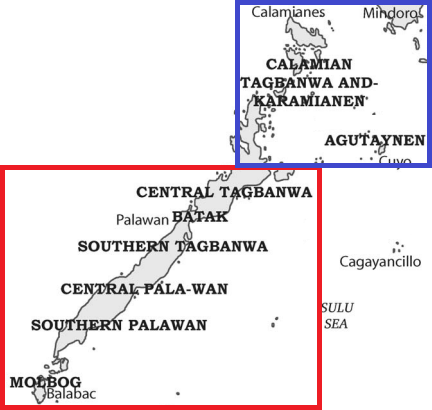|
Palawano Language
The Palawano languages are spoken in the province of Palawan in the Philippines, by the Palawano people. Classification There are three Palawano languages: the ''Quezon Palawano'' which is also known as Central Palawano; Brooke's Point Palawano and its dialect the ''Bugsuk Palawano'' or ''South Palawano'' and Southwest Palawano. The three Palawano languages share the island with several other Palawanic languages which are not part of the Palawano cluster, though they share a fair amount of vocabulary. Phonology The following overview is based on Revel-MacDonald (1979). Consonants Vowels Grammar Verb conjugations are similar to other Filipino dialects with prefixes and suffixes indicating tense, object or actor focus, as well as intention (i.e. commands). These prefixes and suffixes can be used to create various parts of speech from the same root word. For example, ''biyag'', meaning 'life', can be manipulated to mean 'to live' (''megbiyag''), 'full of food' (' ... [...More Info...] [...Related Items...] OR: [Wikipedia] [Google] [Baidu] |
Palawanic Languages
The Palawanic languages are a subgroup in the Greater Central Philippine-family spoken on the island of Palawan and nearby islets. Languages The Palawanic languages are: * Palawano (a dialect cluster) * Aborlan Tagbanwa * Central Tagbanwa (not to be confused with Kalamian Tagbanwa) * Batak (not to be confused with the Batak languages __FORCETOC__ The Batak languages are a subgroup of the Austronesian languages spoken by the Batak people in the Indonesian province of North Sumatra and surrounding areas. Internal classification The Batak languages can be divided into two ...) * Tau't Batu Molbog may also be in this group, closest to Palawano. Reconstruction Proto-Palawanic has been reconstructed by Thiessen (1980). References Further reading *Zorc, R. David. (1972a). Palawano Notes'. *Zorc, R. David. (1972b). Tagbanwa (Northern) Notes'. Greater Central Philippine languages Languages of Palawan {{GCPhilippine-lang-stub ... [...More Info...] [...Related Items...] OR: [Wikipedia] [Google] [Baidu] |
Plosive
In phonetics, a plosive, also known as an occlusive or simply a stop, is a pulmonic consonant in which the vocal tract is blocked so that all airflow ceases. The occlusion may be made with the tongue tip or blade (, ), tongue body (, ), lips (, ), or glottis (). Plosives contrast with nasals, where the vocal tract is blocked but airflow continues through the nose, as in and , and with fricatives, where partial occlusion impedes but does not block airflow in the vocal tract. Terminology The terms ''stop, occlusive,'' and ''plosive'' are often used interchangeably. Linguists who distinguish them may not agree on the distinction being made. The terms refer to different features of the consonant. "Stop" refers to the airflow that is stopped. "Occlusive" refers to the articulation, which occludes (blocks) the vocal tract. "Plosive" refers to the release burst (plosion) of the consonant. Some object to the use of "plosive" for inaudibly released stops, which may then instead be ca ... [...More Info...] [...Related Items...] OR: [Wikipedia] [Google] [Baidu] |
Schwa
In linguistics, specifically phonetics and phonology, schwa (, rarely or ; sometimes spelled shwa) is a vowel sound denoted by the IPA symbol , placed in the central position of the vowel chart. In English and some other languages, it represents the mid central vowel sound (rounded or unrounded), produced when the lips, tongue, and jaw are completely relaxed, such as the vowel sound of the in the English word ''about''. In English, some long-established phonetic transcription systems assert that the mid central vowel as an unstressed vowel and transcribed with schwa (ə) is always a different vowel sound from the open-mid back unrounded vowel as a stressed vowel and transcribed with turned v ( ʌ), although they may recognize allophony between the pair. As Geoff Lindsey explains, within these systems, it is said that "schwa is never stressed"; but other authorities (including Lindsey himself) recognize that in some varieties of English, such as General American Engli ... [...More Info...] [...Related Items...] OR: [Wikipedia] [Google] [Baidu] |

